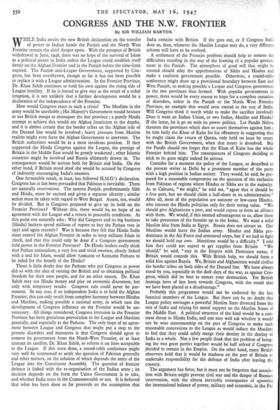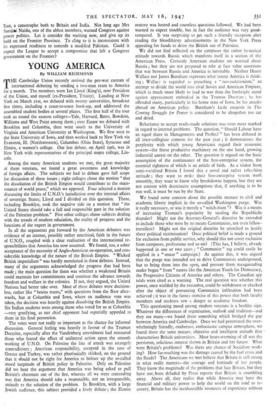CONGRESS AND THE N.W. FRONTIER
By SIR WILLIAM BARTON
WHILE India awaits the new British declaration on the transfer of power to Indian hands the Punjab and the North West Frontier remain the chief danger spots. With the prospect of British withdrawal in June, 1948, there was no hope of the survival of Islam as a political power in India unless the League could establish itself firmly on the Afghan Frontier and in the Punjab before the time-limit expired. The Punjab anti-League Government, supported by Con- gress, has been overthrown, though so far it has not been possible to replace it with a League administration. In the Frontier Province, Dr. Khan Sahib continues to hold his own against the rising tide of League hostility. If he is forced to give way as the result of a tribal irruption, it is not unlikely that a further development would be a declaration of the independence of the Frontier.
How would Congress react to such a crisis? The Muslims in the army would be unreliable ; His Majesty's Government would hesitate to use British troops to reconquer the lost province ; a purely Hindu attempt to achieve this would stir Afghan fanaticism to the depths, and it is almost certain that the border tribes on the Afghan side of the Durand line would be involved ; heavy pressure from Muslim realists might even force the Afghan Government to intervene. The British authorities would be in a most invidious position. If they supported the Hindu Congress against the League, the prestige of Britain in the Middle East would be greatly weakened ; other Islamic countries might be involved and Russia ultimately drawn in. The consequences would be serious both for Britain and India. On the other hand, if Britain stood aloof she would be accused by Congress of indirectly encouraging India's enemies.
One favourable result, at least, has followed H.M.G.'s declaration. Congress has at last been persuaded that Pakistan is inevitable. There are naturally reservations. The eastern Punjab, predominantly Sikh and Hindu, must be excised and given a separate identity ; similar action must be taken with regard to West Bengal. Assam, too, would be divided. But is Congress prepared to give up its hold on the Frontier Province? Without this, there would be no hope of an agreement with the League and a return to peaceable conditions. At this point one naturally asks : Why did Congress and its big business (Hindu) backers spend millions of rupees to buy the Pathan vote in 1937 and again recently? Was it because they felt that Hindu India must control the Afghan Frontier in order to keep militant Islam in check, and that this could only be done if a Congress government held power in the Frontier Province? Do Hindu leaders really think that Pathan nationalism, a very live and vivid emotion, closely linked with a zeal for Islam, would allow 7,000,000 or 8,000,000 Pathans to be ruled for the benefit of the Hindu?
There is little doubt that the Pathans who put Congress in power did so with the idea of ousting the British and so obtaining political freedom for their own people, and for no other reason. Dr. Khan Sahib may use Hindu money and play on economic discontent, but only with temporary results. Congress rule could never be per- manent. In any case, if an independent India is to hold the Afghan Frontier, this can only result from complete harmony between Hindus and Muslims, making possible a national army, in which case the development of Congress influence on the Frontier would be un- necessary. All things considered, Congress intrusion in the Frontier Province has been gratuitous provocation to the League and Muslims generally, and especially to the Pathans. The only hope of an agree- ment between League and Congress that might put a stop to the present disorders and massacres is that Congress should agree to remove its government from the North-West Frontier, or at least instruct its satellite, Dr. Khan Sahib, to reform it on lines acceptable to the League. If this were done, a round-table conference might very well be summoned to settle the question of Pakistan generally and other matters, on the solution of which depends the entry of the League into the Constituent Assembly. The question of frontier defence is linked with the re-organisation of the Indian army ; its decision depends on the form the Union Government is to take, and whether India stays in the Commonwealth or not. It is believed that what has been done so far proceeds on the assumption that India remains with Britain. If she goes out, or if Congress India does so, then, whatever the Muslim League may do, a very different scheme will have to be evolved.
A settlement of the Frontier problem should help to remove the difficulties standing in the way of the forming of a popular govern- ment in the Punjab. The atmosphere of good will that might lx created should allay the apprehensions of Sikhs and Hindus and make a coalition government possible. Otherwise, a round-table conference might draw up a provisional boundary between East and West Punjab, so making possible a League and Congress government in the two provinces thus formed. With popular governments in power, there would be every reason to hope for a complete cessation of disorders, either in the Punjab or the North West Frontier Province, an example that would soon extend to the rest of India. Will Congress think it worth while to make the sacrifice involved? Does it want an Indian Union, or two Indies, Muslim and Hindu? If the latter, let it go on with its power politics. Let Pandit Nehru threaten the provinces which dare to assert themselves against him ; let him bully the Khan of Kalat for his effrontery in suggesting that he might claim the return of Quetta, only held on lease by treaty with the British Government, when that treaty is dissolved. But the Pandit should not forget that the Khan of Kalat has the whole Frontier behind him. The consequences of Congress deciding to stick to its guns might indeed be serious.
Consider for a moment the policy of the League, as described to the present writer in Delhi by a prominent member of the party with a high position in Indian society. They would, he said, be pre- pared for a reasonable compromise on the question of the exclusion from Pakistan of regions where Hindus or Sikhs are in the majority. As to Calcutta, " we might," he told me, " agree that it should be a free port, but we should claim a half-share in its administration." After all, most of the population are outcaste or low-caste Hindus, who interest the Hindu politician only for their voting value. " We should give Afghanistan a port, and would expect to form an alliance with them. We would, if this seemed advantageous to us, allow them to take possession of the frontier up to the Indus. We want a solid Muslim bloc from India to Egypt. Russia does not attract us. Our Muslims would leave the Indian army. Hindus and Sikhs pre- dominate in the Air Force and armoured corps, but if we had to fight we should hold our own. Munitions would be a difficulty." I told him they could not expect to get supplies from Britain. " We should," he said, " stay in the Empire with Dominion status, if Britain would concede this. With British help, we should form a solid bloc against Russia. We, Britain and Afghanistan would civilise the border tribes on both sides of the Durand line. We have always stood by you, especially in the dark days of the war, as against Con- gress, •which did its best to ensure your destruction. Yet British leanings have of late been towards Congress, with the result that we have been placed at a disadvantage."
Probably this programme would not be endorsed by the less fanatical members of the League. But there can be no doubt that League policy envisages a powerful Muslim State divorced from the rest of India and relying for moral support on the Muslim States of the Middle East. A political structure of the kind would be a con- stant threat to Hindu India, and one may well ask whether it would not be wise statesmanship on the part of Congress to make such reasonable concessions to the League as would induce the Muslims to feel that they could safely merge their destiny in the destiny of India as a whole. Not a few people think that the problem of bring- ing the two great parties together would be half solved if Congress .decided to remain in the Empire. On the other hand, many British observers hold that it would be madness on the part of Britain to undertake responsibility for the defence of India after leaving the country.
The argument has force, but it must not be forgotten that associa- tion with Britain might prevent civil war and the danger of Russian intervention, with the almost inevitable consequence of upsetting the international balance of power, military and economic, in the Far East, a catastrophe both to Britain and India. Not long ago Mrs Sarojiai Naidu, one of the ablest members, warned Congress against power politics. Let it consider the warning now, and give up its hold on the Frontier Province. To cling to it is inconsistent with its expressed readiness to concede a modified Pakistan. Could it expect the League to accept a compromise that left a Congress government on the Frontier?



































 Previous page
Previous page